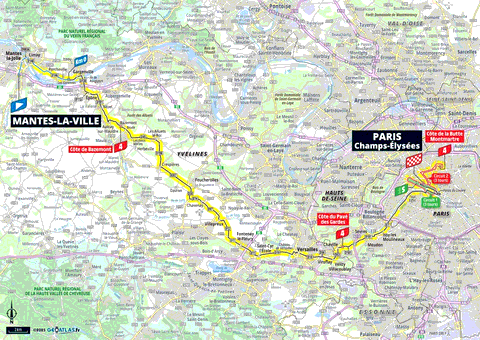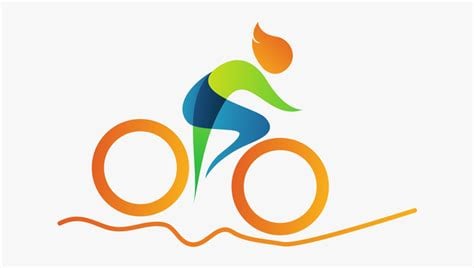Sunday 27: 16:10–16:25 → 19:25–19:45
NB : today, the women stage will finish one hour before the men stage starts.


The Tour is back in Paris, but for the first time, a climb up Montmartre is included in the Champs Élysées loop.
Ruling point (art. 20.b): if it is/starts raining, the times are taken on the first/subsequent passage over the finish ligne.
Thanks for all the race threads over the last weeks!
What are your feelings about this tour?
As far as I am concerned, I rather liked it.
The mountain stages were somewhat disappointing, but aren’t they almost always so? (Except 1 recent year when Pogatchar and Vingegaard were knocking up attacks from outer space.). Vingegaard couldn’t do anything against Pogatchar and Pogatchar behaved weirdly once he had asserted his domination on the first two Pyrénées stages (mass start and TT). Mont Ventoux stage was however a positive surprise, we can note it is also the only one when the leaders’ peloton allowed the breakaway a sufficient time gap, so we could have two separated levels of racing.
Then there were 5 sprint stages. For me, these are absolutely useless, but there have a few vocal fans. I think that they are more than useless: detrimental. They may be the main cause of the withdrawal of important riders, not to mention those who didn’t abandon but were diminished. Ganna (!), Bisseger and Van den berg as soon as the 1st stage; Philipsen and Jeannière on the 3rd; Zimmermann and Wærenskjold on the 9th; Barthe and C. Rodriguez on the 17th.
Punchers stage were OK. Good but stereotyped: I would like to see more open stages, like the last before Paris, or Carcassonne and perhaps Toulouse, where punchers can shine, but also tough all-terrain breakawaymen/classicmen and possibly a couple of all-terrain sprinters. Note: the Mûr de Bretagne stage was the main cause for withdrawals after the sprinters stages. When the stage has a strong puncher stereotype (the Flèche Wallone sterotype, if you want), the unfolding is too similar to a sprinter stage: most of the stage is relatively slow, boring in the peloton (which can also cause crashes), and then the final is super fast and tense.
Paris stage was a good surprise. Although I may not have said this if Pogatchar had won (nevertheless, I must congratulate him for trying, he didn’t need to), or if there had been a crash. They were on a razor’s edge, in spite of being more careful than usual. I wish the organiser could find a less risky way of going downhill, but that’s probably not possible.
Side classifications were rather disappointing. With the withdrawal of the two Alpecin riders, Pogatchar could have won it if he wished so. Milan did want his jersey and did what he could for it, but in a way he only got it thanks to Pogatchar AND other teams handing it to him.
There were few riders interested in the mountain jersey. L. Martinez was the most interested, but he failed badly at it: very bad tactics, random legs, cheating; that’s a bad mix. Woods tried a bit, Arensman perhaps but he was lucky to get two wins on the top. Most the time, the jersey was worn by someone who didn’t want it… The scale and the distribution of passes (mountain stages in the tour and passes within mountain stages) didn’t help, but the problem is deeper.
On the French side, Jegat and Vauquelin were unexpected in the top-10 (even though the gaps are terrible). They put up a good fight everyday (often in the background, so they are lucky that it was the tour of France filmed by French TV and we could follow their struggle), and despite those daily efforts, they were again at the front of the race on the last Saturday (Jegat) and Sunday (Vauquelin)! Stage-wise, V. Paret-peintre saved the honour on the Mont Ventoux; other than that the appraisal for France is awful: a single stage podium with Alaphilippe (Carcassonne). If we consider that best French riders are almost only punchers and it was a tour for punchers, that’s terrible.
I agree with most of your points. This year’s Tour was less exciting than last year’s, but 2024 was also one of the greatest I can remember (so many amazing narratives) so that was to be expected. There were some strong individual stages this year but every jersey suffered from a disappointing lack of competition (except maybe the white jersey) and that did suck some of the excitement out of the race. Some of that is just the way cycling goes (Pogacar too strong in Yellow, top sprinters crashing out or suffering bad luck leaving Milan unopposed) but the KoM jersey seems to be suffering greatly from the strength of the big teams in this current era and maybe needs some changes to liven it up. The pace is so high and the racing so frenetic that I think a lot of the lesser climbers who would possibly be interested in the KoM jersey just don’t have the energy to get themselves into multiple breakaways or stay away long enough to collect more points than the GC leaders. The Australian commentators talk a lot about Storer’s potential to become the first Australian KoM winner, but he doesn’t seem to be particularly interested and I think part of the reason is that it is so much effort and risk compared to trying for a stage win. One of the reasons I love Grand Tours is because of these “race within a race” dynamics across all the different jerseys and it was disappointing that we didn’t really get that this year. It was all about the GC (which was over quite quickly) and stage wins.
Great race and great winner, today and the whole tour. I sure like this new route for the final stage
I secretly hope TP will let Jonas win 1 fucking stage today but I know it will be a sprinter.
Ben Healy (🇮🇪 EF) got the Super-Combative title. The official rules state that it is only selected by the jury “at the end of the Tour de France”. So apparently the Tour ended this morning… 🧐 😠
This was the most surprising thing to me, when I first watched le tour (they don’t compete on the last day). I was like, if you could move up in the GC, why not?
Now I get it, TBC.
Usually you can, it was just that the flat terrain and sprint teams made it near impossible to gain any meaningful time. As a result, it was considered a bit of an unwritten rule that you don’t attack and respect the results of the last 20 days of racing. This year the time gaps were neutralised on Montmartre because of the wet conditions (pre-race safety rule).



